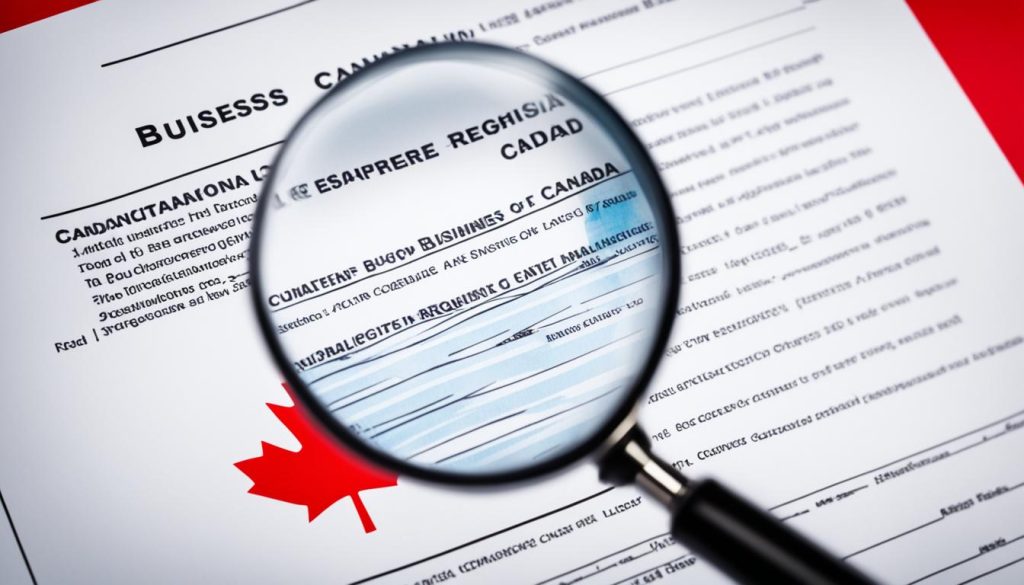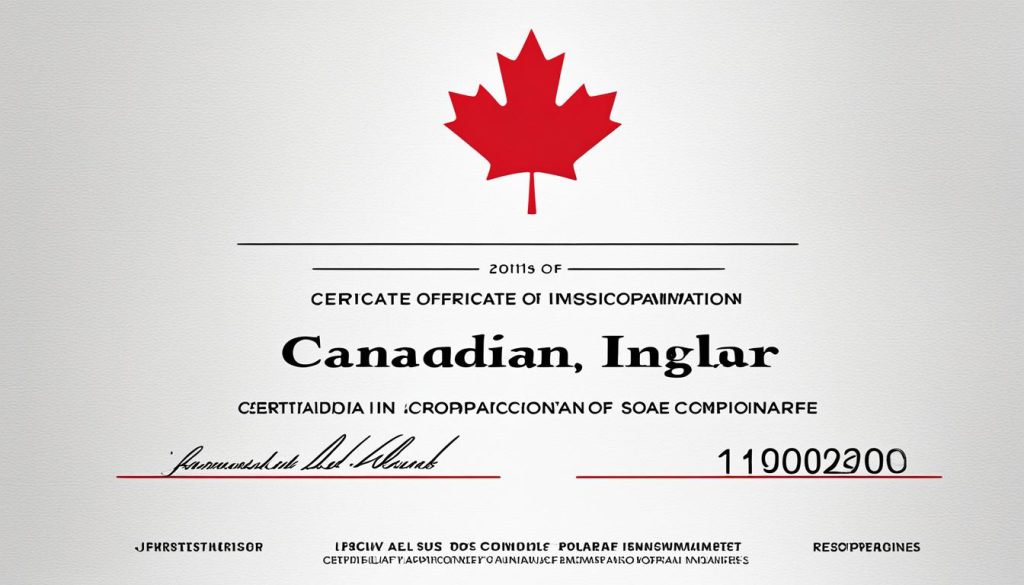Did you know that over 1.2 million businesses are incorporated in Canada, contributing trillions to the nation’s thriving economy? Incorporating your enterprise is a strategic decision that can unlock a wealth of legal and tax advantages for your company. This comprehensive guide will walk you through the step-by-step process of incorporating a business in Canada, empowering you with the knowledge and guidance needed to successfully establish your Canadian enterprise.
Whether you’re a new entrepreneur or an established business owner, this expert-driven article will cover everything from understanding the incorporation process and choosing the right jurisdiction to selecting and registering a unique business name, completing the necessary paperwork, obtaining a certificate of incorporation, finalizing the internal structure, and navigating the costs and ongoing compliance requirements. With this invaluable information, you’ll be well-equipped to incorporate your Canadian business and set it up for long-term success.
Understanding Incorporation
Incorporation is the process of creating a legal entity, known as a corporation, that is separate from the individual(s) who own it. What is incorporation in Canada? By incorporating, a business becomes a separate legal entity with its own rights and obligations. This separation offers several key benefits of incorporation in Canada, including limited liability, where the corporation is responsible for its own debts and obligations rather than the individual owners.
Legal Advantages
Incorporation also provides legal advantages of incorporation in Canada, such as continuity of the business even if the founders depart. The corporate structure ensures the business can continue operating without interruption, which is a significant benefit for entrepreneurs.
Tax Advantages
In addition to the legal advantages, incorporation offers tax advantages of incorporation in Canada, including lower corporate tax rates and the ability to defer taxation on retained earnings within the corporation. This allows the business to reinvest profits back into the company’s growth and development, rather than immediately distributing earnings to the owners.
| Benefit | Description |
|---|---|
| Limited Liability | The corporation, not the individual owners, is responsible for the business’s debts and obligations. |
| Continuity | The business can continue operating even if the founders depart, providing stability and longevity. |
| Lower Taxes | Corporations benefit from lower tax rates and the ability to defer taxation on retained earnings. |
Choosing a Jurisdiction
When incorporating a business in Canada, entrepreneurs have the option to register at the federal level or at the provincial/territorial level. Each option presents its own set of advantages and considerations.
Federal Incorporation
Federal incorporation provides nationwide name protection and allows the business to operate across Canada without the need for additional provincial or territorial registrations. This can be particularly beneficial for companies with a national or international scope. However, federal incorporation may have additional requirements, such as a minimum of 25% of directors residing in Canada.
Provincial or Territorial Incorporation
Incorporating at the provincial or territorial level is generally a faster and more cost-effective process. Businesses incorporated provincially or territorially are able to operate within their home jurisdiction, but may need to obtain additional licenses or registrations to expand their operations outside of their home province or territory.
Entrepreneurs must carefully evaluate the advantages and drawbacks of each incorporation option to determine the best jurisdiction for their business. Factors to consider include the company’s operational scope, legal and tax implications, ongoing compliance requirements, and the specific needs of the enterprise.
| Incorporation Option | Advantages | Considerations |
|---|---|---|
| Federal Incorporation |
|
|
| Provincial or Territorial Incorporation |
|
|
By understanding the differences between federal incorporation in Canada and provincial incorporation in Canada or territorial incorporation in Canada, entrepreneurs can make an informed decision on the best where to incorporate a business in Canada for their specific needs and goals.

Confirming Legal Status
Before incorporating a business in Canada, it’s crucial to confirm the appropriate legal structure for your venture. While corporations are one of the most common business entities in Canada, entrepreneurs may also consider alternative legal structures for businesses, such as general partnerships, limited partnerships, joint ventures, non-profit organizations, cooperatives, associations, and trusts.
Each business legal structure in Canada comes with its own unique rules, regulations, and requirements regarding taxation, liability, and operations. Carefully evaluating the pros and cons of each type of business entity is essential to ensure you select the option that best aligns with your business needs and long-term goals.
| Business Legal Structure | Key Characteristics | Taxation | Liability |
|---|---|---|---|
| Corporation | Separate legal entity, limited liability | Corporate tax rates, potential for tax deferral | Limited liability for shareholders |
| General Partnership | No legal separation, shared ownership and decision-making | Pass-through taxation, partners report income on personal returns | Unlimited liability for all partners |
| Limited Partnership | Combination of general and limited partners, limited partners have limited liability | Pass-through taxation, partners report income on personal returns | Limited liability for limited partners, unlimited liability for general partners |
| Non-Profit Organization | Organized for charitable, educational, or other non-commercial purposes | Tax-exempt status, can generate revenue but must use funds for non-profit purposes | Limited liability for directors and members |
By thoroughly understanding the various business legal structures in Canada and carefully selecting the one that best suits your enterprise, entrepreneurs can lay the foundation for a successful and well-structured business venture.
Selecting and Registering a Business Name
When it comes to incorporating a business in Canada, selecting and registering a unique business name is a crucial step. Entrepreneurs have the option to choose between a numbered name, which is a straightforward choice assigned by the government, or a word name that must meet specific requirements.
Numbered Name vs. Word Name
A numbered name, also known as a “numbered company,” is a simple and direct way to register a business in Canada. These names typically start with a number, such as “123456 Canada Inc.,” and are assigned by the government. In contrast, a word name must adhere to certain guidelines, including having a distinctive element, a descriptive element, and a legal ending like “Inc.” or “Ltd.”
Name Requirements
When selecting a word name for an incorporated business in Canada, entrepreneurs must ensure the proposed name meets the necessary requirements. This includes having a unique and distinctive element that sets the business apart, a descriptive element that clearly conveys the nature of the company’s activities, and a proper legal ending that aligns with the chosen jurisdiction’s corporate laws.
Name Search and Registration
Before finalizing a business name, it is essential to conduct a thorough trademark search to confirm the desired name is available and not already in use. The name registration process varies across different jurisdictions in Canada, but generally involves submitting the proposed name for approval and paying the associated fees.

By carefully considering the options and following the proper name selection and registration process, entrepreneurs can ensure their incorporated business in Canada has a strong, unique, and legally compliant identity.
How to Incorporate a Business in Canada?
The process of incorporating a business in Canada typically involves several key steps. By understanding and navigating these steps, entrepreneurs can successfully establish their enterprise as a legally recognized entity, unlocking a range of benefits and positioning their business for long-term success.
Step 1: Choose a Jurisdiction
The first step in the incorporation process is to determine the appropriate jurisdiction, whether at the federal or provincial/territorial level. This decision should be based on the specific operational needs and goals of the business, as each option offers unique advantages and considerations.
Step 2: Confirm Legal Status
Before moving forward with incorporation, it’s crucial to confirm the most suitable legal structure for the business, such as a corporation, partnership, or cooperative. This decision will have important implications for taxation, liability, and overall operations.
Step 3: Select and Register Business Name
Selecting and registering a unique business name is a critical step in the incorporation process. Entrepreneurs must ensure the proposed name meets all applicable requirements, including having a distinctive and descriptive element, as well as the appropriate legal ending (e.g., “Inc.” or “Ltd.”).
Step 4: Complete Paperwork
The incorporation process involves the completion of various paperwork, which may include articles of incorporation, by-laws, and other corporate documents. Entrepreneurs should carefully review and submit these materials to the relevant government authorities.
Step 5: Pay Incorporation Fees
The final step in the incorporation process is to pay the required fees, which can range from a few hundred to a few thousand dollars, depending on the jurisdiction and any additional services or requirements. These fees are necessary to officially establish the business as a legally recognized entity.
By following these steps, entrepreneurs can successfully incorporate their business in Canada, unlocking the legal and tax advantages that come with this important milestone. Seeking guidance from legal, accounting, and business professionals can help ensure the incorporation process is completed efficiently and in compliance with all applicable regulations.
Obtaining Certificate of Incorporation
Once the incorporation paperwork has been submitted and the fees paid, the business will receive its Certificate of Incorporation. This document serves as official proof that the corporation has been legally established and recognized by the government. The Certificate of Incorporation contains important information about the business, such as its legal name, the date of incorporation, and the jurisdiction in which it was incorporated.
Entrepreneurs should carefully review the Certificate of Incorporation to ensure all the details are accurate before proceeding with the next steps of finalizing the internal structure of the new corporation. This certificate of incorporation for canadian businesses is a crucial step in the incorporation process, as it officially signifies the establishment of the company and its legal status.
Obtaining the certificate of incorporation in canada is an essential milestone for entrepreneurs looking to get a certificate of incorporation in canada and set their business on a strong foundation for growth and success.

Finalizing Internal Structure
After successfully obtaining the Certificate of Incorporation, the next crucial step is to finalize the new corporation’s internal structure. This process involves several key components, including issuing shares, adopting by-laws, appointing officers, and potentially creating a shareholder agreement. These steps are essential in establishing a solid foundation for the corporation and ensuring the business is properly set up for long-term success.
1. Issuing Shares
One of the first tasks in finalizing the internal structure is to issue shares to the shareholders of the Canadian corporation. This involves determining the number and class of shares to be issued, as well as the rights and privileges associated with each class. Careful consideration must be given to the ownership structure and the distribution of control within the organization.
2. Adopting By-laws
By-laws are the set of rules and regulations that govern the corporation’s operations. Adopting comprehensive by-laws is crucial to ensure the smooth running of the business. These by-laws should cover key areas such as shareholder meetings, director responsibilities, financial management, and conflict resolution procedures.
3. Appointing Officers
The corporation must also appoint the necessary officers to manage the day-to-day affairs of the business. This typically includes positions such as the President, Vice-President, Secretary, and Treasurer. The roles and responsibilities of each officer should be clearly defined in the by-laws to ensure effective leadership and decision-making.
4. Shareholder Agreement
In some cases, it may be beneficial for the shareholders to create a shareholder agreement. This legal document outlines the rights, responsibilities, and obligations of the shareholders, addressing issues such as share transfer restrictions, buy-sell provisions, and decision-making processes. A well-crafted shareholder agreement can help prevent future disputes and ensure the long-term stability of the corporation.
Consulting with experienced legal and financial professionals is highly recommended during this stage of the incorporation process. These experts can provide valuable guidance on the appropriate corporate structure, share issuance, by-law development, and the creation of a shareholder agreement, ensuring the new corporation is set up for success.
Costs of Incorporation
The costs associated with incorporating a business in Canada can vary depending on the jurisdiction and the level of professional assistance required. Government fees for federal incorporation typically range from $200 to $300, while provincial or territorial incorporation may cost between $265 and $450, plus additional fees for name searches and registrations.
Entrepreneurs may also need to factor in the cost of professional services, such as legal advice and accounting support, which can add several hundred to a few thousand dollars to the overall incorporation expenses. While the upfront costs can be significant, the long-term benefits of incorporation often outweigh the initial investment.
| Cost Factor | Estimated Range |
|---|---|
| Government Fees for Federal Incorporation | $200 to $300 |
| Government Fees for Provincial/Territorial Incorporation | $265 to $450 (plus additional fees for name searches and registrations) |
| Professional Fees (Legal and Accounting) | Several hundred to a few thousand dollars |
By understanding these costs of incorporation and seeking the guidance of professional advisors, Canadian entrepreneurs can make informed decisions and ensure their business is set up for long-term success.

Ongoing Compliance and Maintenance
Incorporating a business in Canada is not a one-time event; it requires ongoing compliance and maintenance. Corporations must fulfill annual filing requirements, such as submitting annual returns and financial statements, to maintain their good standing with the government. Additionally, corporations must keep meticulous records, including meeting minutes, shareholder and director information, and financial documentation.
Failure to comply with these ongoing obligations can result in penalties or even the dissolution of the corporation. Seeking the guidance of professional advisors, such as accountants and lawyers, can help ensure a corporation remains compliant and well-organized.
1. Annual Filings
As part of the ongoing compliance requirements for incorporated businesses in Canada, corporations must submit annual filings for Canadian corporations. This typically includes filing annual returns and financial statements to maintain the corporation’s good standing with the government.
2. Record-keeping
Meticulous record-keeping for incorporated companies in Canada is essential for compliance and effective business management. Corporations must maintain accurate and up-to-date records, such as meeting minutes, shareholder and director information, and financial documentation.
| Ongoing Compliance Requirement | Description |
|---|---|
| Annual Filings | Submitting annual returns and financial statements to maintain the corporation’s good standing with the government. |
| Record-keeping | Maintaining accurate and up-to-date records, including meeting minutes, shareholder and director information, and financial documentation. |
Seeking Professional Advice
Incorporating a business in Canada can be a complex process, and seeking professional advice is highly recommended.
Lawyers can provide guidance on the legal requirements and documentation, help ensure compliance with corporate laws, and advise on the best corporate structure for the business. Lawyers for incorporating a business in Canada can be invaluable in navigating the incorporation process and setting the company up for long-term success.
Accountants can assist with understanding the tax implications of incorporation, setting up the necessary financial systems and records, and providing ongoing tax planning and compliance support. Accountants for incorporating a business in Canada can help entrepreneurs optimize their tax strategy and maintain financial integrity throughout the incorporation journey.
Business advisors, such as consultants or industry experts, can offer valuable insights on the practical aspects of running an incorporated business, including growth strategies, operational best practices, and risk management. Business advisors for incorporating a business in Canada can provide the expertise and guidance needed to make informed decisions and position the company for sustainable growth.
Engaging these professional help for incorporating a business in Canada can help entrepreneurs navigate the incorporation process with confidence and set their business up for long-term success.
Conclusion
Incorporating a business in Canada offers numerous legal and tax benefits that can help entrepreneurs strengthen their enterprise and position it for long-term growth and success. By understanding the incorporation process, choosing the right jurisdiction, selecting a unique business name, completing the necessary paperwork, and finalizing the internal structure, business owners can establish a solid foundation for their incorporated company. While the costs and administrative requirements of incorporation should not be overlooked, the advantages often outweigh the initial investment.
By seeking guidance from legal, accounting, and business professionals, entrepreneurs can ensure their incorporation is done correctly and their company is positioned for ongoing compliance and success. With this comprehensive guide, Canadian business owners can take the next step in their entrepreneurial journey and incorporate their enterprise with confidence. The conclusion on incorporating a business in Canada is clear – it offers a multitude of benefits that can propel a business towards long-term growth and success.
The conclusion on incorporating a business in Canada highlights the significance of understanding the incorporation process, choosing the right jurisdiction, and finalizing the internal structure to establish a strong foundation for the company. By seeking professional advice and navigating the incorporation journey with confidence, Canadian entrepreneurs can unlock the numerous legal and tax advantages that incorporation offers, positioning their business for long-term growth and success.
FAQ
1. How much does it cost to incorporate a business in Canada?
The costs associated with incorporating a business in Canada can vary depending on the jurisdiction and the level of professional assistance required. Government fees for federal incorporation typically range from $200 to $300, while provincial or territorial incorporation may cost between $265 and $450, plus additional fees for name searches and registrations. Entrepreneurs may also need to factor in the cost of professional services, such as legal advice and accounting support, which can add several hundred to a few thousand dollars to the overall incorporation expenses.
2. How can I incorporate my business in Canada?
The process of incorporating a business in Canada typically involves the following steps: 1) Choosing a jurisdiction, either at the federal or provincial/territorial level, based on the business’s operational needs and goals. 2) Confirming the appropriate legal status for the business, such as a corporation, partnership, or cooperative. 3) Selecting and registering a unique business name that meets the applicable requirements. 4) Completing the necessary incorporation paperwork, which may include articles of incorporation, by-laws, and other corporate documents. 5) Paying the required incorporation fees.
3. At what income level should I incorporate?
There is no specific income level that should trigger the decision to incorporate a business in Canada. The choice to incorporate should be based on a variety of factors, including the legal and tax advantages it offers, the growth potential of the business, the need for limited liability, and the overall strategic goals of the entrepreneur. Consulting with legal and financial professionals can help determine the appropriate time to incorporate, based on the unique circumstances of the business.
4. Is it better to incorporate or sole proprietor in Canada?
The decision to incorporate or operate as a sole proprietor in Canada depends on the specific needs and goals of the business. Incorporation offers several key benefits, including limited liability, legal advantages, and tax advantages. However, it also comes with additional costs and administrative requirements. Sole proprietorship is generally simpler and more cost-effective, but the business owner is personally liable for the business’s debts and obligations. Entrepreneurs should carefully weigh the pros and cons of each option to determine the best structure for their business.
5. Will I pay less taxes if I incorporate?
Incorporating a business in Canada can provide certain tax advantages, but the impact on taxes will depend on the specific circumstances of the business. Incorporated businesses generally benefit from lower corporate tax rates compared to personal income tax rates. Additionally, corporations can defer taxation on retained earnings within the business, which can be beneficial for growth and reinvestment. However, the overall tax implications will depend on factors such as the business’s income, expenses, and the personal tax situation of the owners. Consulting with an accountant is recommended to fully understand the tax implications of incorporation.




